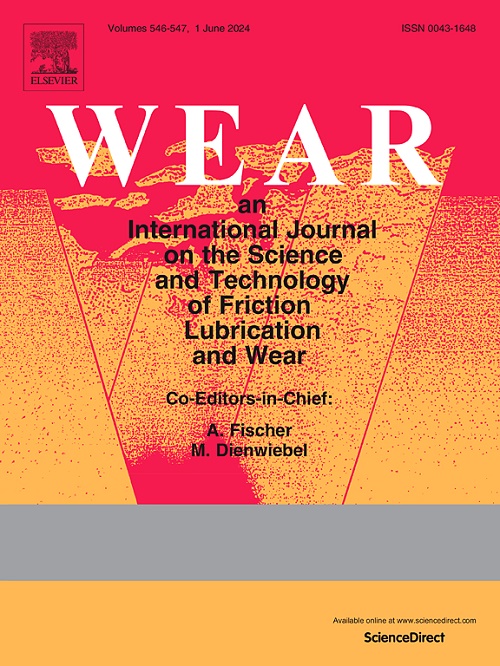Halogen-free ionic liquid as metalworking fluid: Impact on tool wear and surface roughness in machining of Ti6Al4V alloys
IF 5.3
1区 工程技术
Q1 ENGINEERING, MECHANICAL
引用次数: 0
Abstract
Titanium alloys are known for their poor thermal conductivity. During dry machining of titanium alloy, significant heat is generated, which has detrimental effect on the quality of machined components and longevity of cutting tools. Therefore, metalworking fluids (MWFs) are employed during machining. Vegetable oils are currently recognised as a viable environmentally friendly alternative to petroleum based MWFs owing to their biodegradability, renewability, low toxicity, and efficient lubricating qualities. However, they are also known for poor oxidation stability and inadequate performance at low temperatures. Halogen-free ionic liquids (HF-IL) are evolves as potential additive to MWFs due to its distinct properties such as high thermal stability and oxidation stability. This work compares the effect of varying concentration of phosphonium based HF-IL in canola oil on its thermos-physical properties such as wettability and thermal conductivity. It was found that the addition of HF-IL in canola oil improves the MWFs spreadability by 4045 % by compared to pure canola oil. Further, machining experiments were conducted under three different environments; dry, canola oil and phosphonium based HF-IL blended with canola oil at varying feeds. Machining responses such as cutting temperature, tool flank and rake wear, machined surface roughness and chip morphology were analysed. The findings demonstrated that the use of HF-IL as additives led to drop in cutting temperature by 6893 % and reduction in surface roughness by 2461 % at different feeds compared to dry machining. Furthermore, scanning electron microscopy and energy dispersive spectroscopy examinations elucidated the wear mechanism on tools under different machining environments. HF-IL environment showed the lowest tool flank and rake wear. These data corroborate the effectiveness of HF-IL as MWFs additive to improve tool life and surface finish.
无卤离子液体作为金属加工液:在加工 Ti6Al4V 合金时对刀具磨损和表面粗糙度的影响
钛合金以导热性差而闻名。钛合金干式加工过程中会产生大量的热量,对被加工零件的质量和刀具的使用寿命产生不利影响。因此,在加工过程中使用金属加工液(MWFs)。由于植物油具有生物可降解性、可再生性、低毒性和高效的润滑特性,目前被认为是石油基MWFs的可行的环保替代品。然而,它们也因氧化稳定性差和低温性能不足而闻名。无卤离子液体(HF-IL)由于其高热稳定性和氧化稳定性等独特的特性而成为MWFs的潜在添加剂。这项工作比较了菜籽油中不同浓度的磷基HF-IL对其热物理性质(如润湿性和导热性)的影响。结果表明,与纯菜籽油相比,菜籽油中添加HF-IL可使MWFs的涂抹性提高40 ~ 45%。进一步进行了三种不同环境下的加工实验;干菜籽油和以磷为基础的HF-IL与菜籽油在不同饲料中混合。分析了切削温度、刀面和刀尖磨损、加工表面粗糙度和切屑形貌等加工响应。结果表明,与干式加工相比,在不同进给量下,使用HF-IL作为添加剂可使切削温度降低68 ~ 93%,表面粗糙度降低24 ~ 61%。此外,通过扫描电镜和能谱分析分析了刀具在不同加工环境下的磨损机理。HF-IL环境下刀具侧面和刀尖磨损最小。这些数据证实了HF-IL作为MWFs添加剂在提高刀具寿命和表面光洁度方面的有效性。
本文章由计算机程序翻译,如有差异,请以英文原文为准。
求助全文
约1分钟内获得全文
求助全文
来源期刊

Wear
工程技术-材料科学:综合
CiteScore
8.80
自引率
8.00%
发文量
280
审稿时长
47 days
期刊介绍:
Wear journal is dedicated to the advancement of basic and applied knowledge concerning the nature of wear of materials. Broadly, topics of interest range from development of fundamental understanding of the mechanisms of wear to innovative solutions to practical engineering problems. Authors of experimental studies are expected to comment on the repeatability of the data, and whenever possible, conduct multiple measurements under similar testing conditions. Further, Wear embraces the highest standards of professional ethics, and the detection of matching content, either in written or graphical form, from other publications by the current authors or by others, may result in rejection.
 求助内容:
求助内容: 应助结果提醒方式:
应助结果提醒方式:


